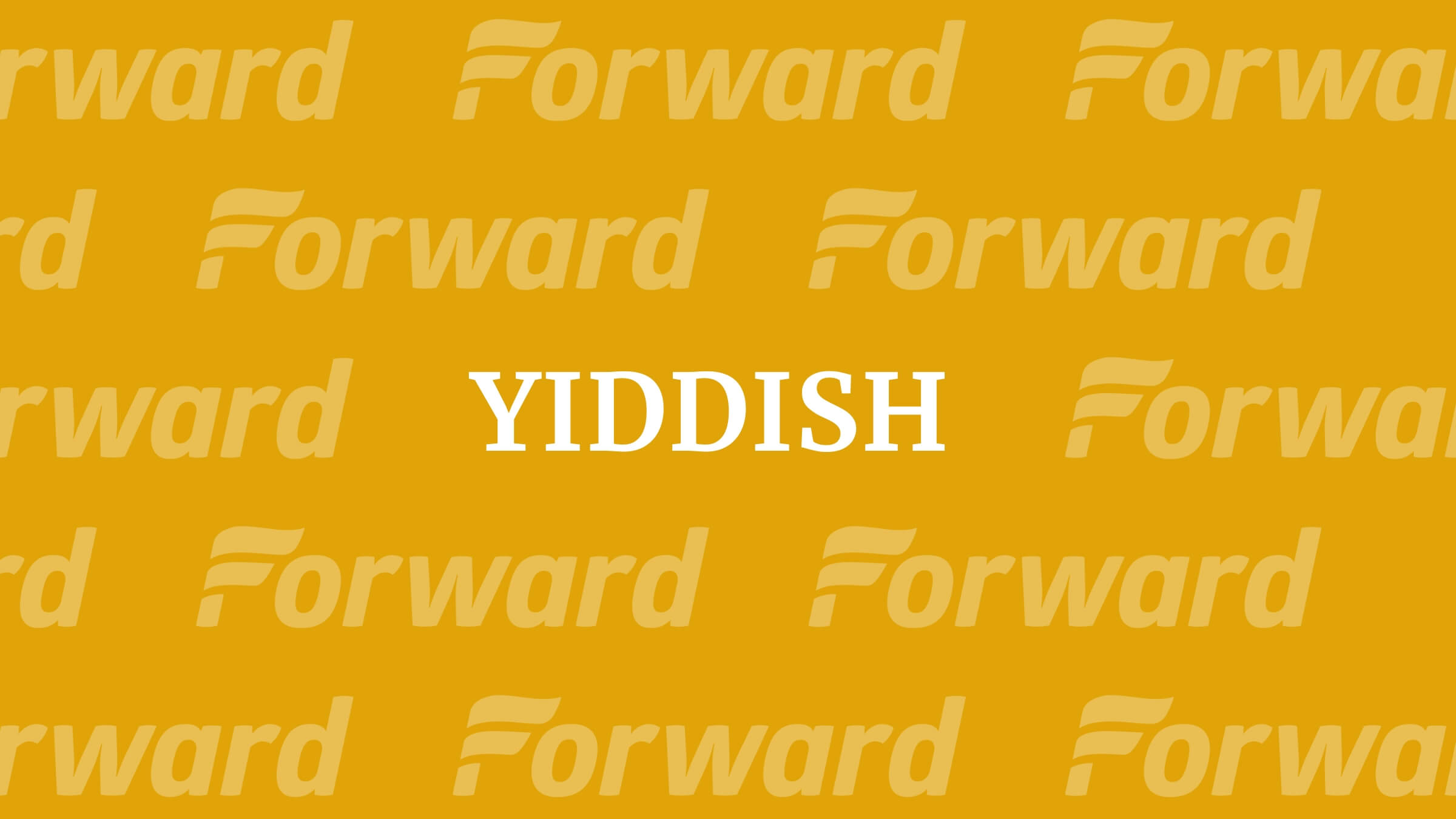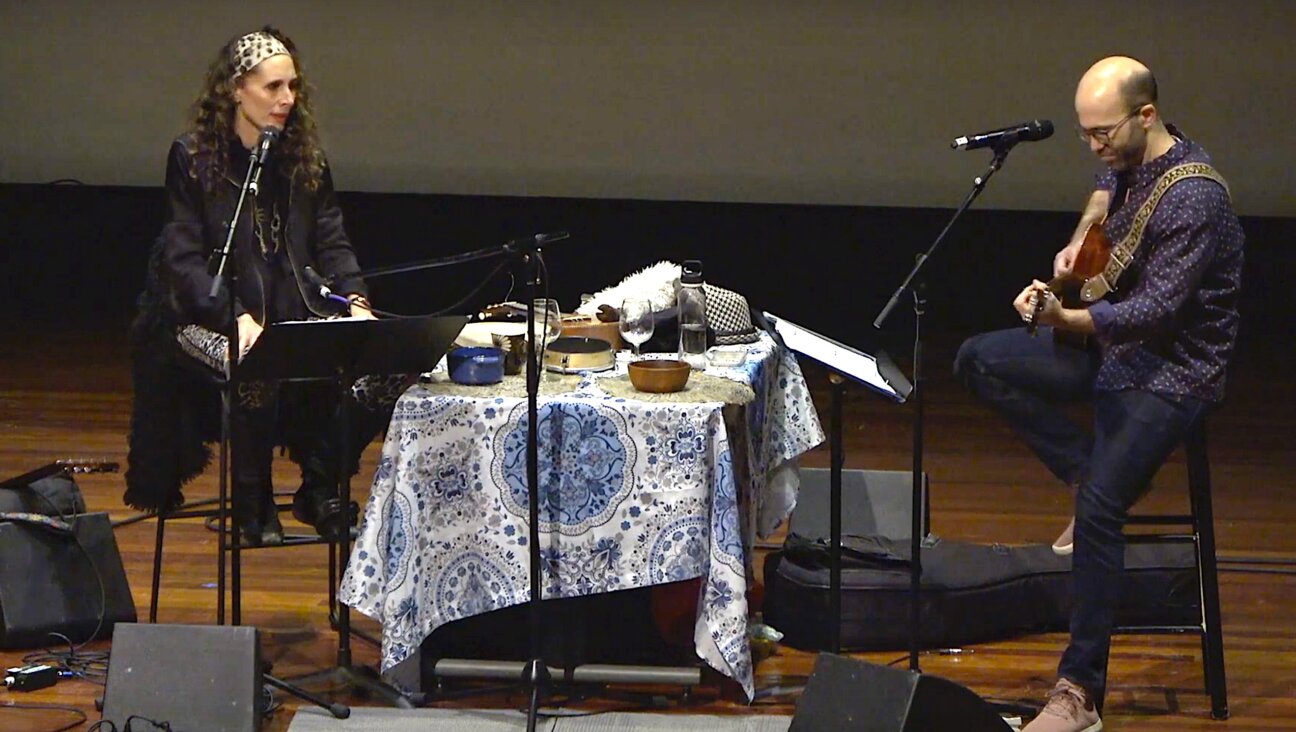Queer Yiddish Camp, a new alternative to summer Yiddish intensives

Graphic by Angelie Zaslavsky
In the last few years, the Yiddish world has seen initiatives like Yiddish Duolingo, Yiddish Harry Potter and Yiddish TikTok attract new generations of Yiddishists. Starting in May, an online summer Yiddish intensive called Queer Yiddish Camp joins this new wave.
Summer Yiddish intensives, like those run by YIVO and the Yiddish Book Center, hold cultural events, lectures and language classes at all levels. They have been the engines bringing hundreds of students to Yiddish proficiency and cultural appreciation. These programs — some in person and others on Zoom — employ renowned teachers and professors, as well as cultural performers and generally run for around six weeks. Queer Yiddish Camp, held on Zoom, joins these ranks, but without any of the institutional, financial or organizational backing that sustains other such programs, and will run for just two weeks.
The camp’s teachers, each of whom have been key players in the Yiddish world for years, all identify as queer, and include Rivke Margolis, a professor at Monash University in Australia, and Noyekh Barrera, a prominent voice in the Yiddish TikTok world. Ethel Reim, who has taught unaccompanied Yiddish singing around the world for more than a decade, will be among the culture lecturers.
For decades, queer Yiddishists, such as Shane Baker and members of the musical group The Klezmatics, have been instrumental in advancing Yiddish cultural and academic activity. Myra Mniewski, former director of Yiddishist organization Yugntruf- Youth for Yiddish, recalls that, though the Yiddish world has been supported by many queer scholars, cultural activists and writers like Mniewski, the mainstream Yiddish world did not and sometimes continues to not be a place where queerness is celebrated. “I think the queers have been the leaders of our time. They have been in the forefront, and have not brought their queerness to the forefront,” Mniewski said.
This feeling of being uncomfortable and unwelcome in mainstream Yiddish programs has not gone unnoticed. One of the teachers at Queer Yiddish Camp, Sasha Berenstein, put together a list of terms for trans and nonbinary inclusivity a few years ago. Yet some teachers at these Yiddish programs did not use the terms or pronouns for trans or nonbinary inclusivity for as long or as consistently as many students wanted. This was one of the reasons why freygl gertsovski decided to create Queer Yiddish Camp.
gertsovski, a Toronto-based community organizer who began studying Yiddish six years ago, created the Facebook groups “queer yiddishkayt” and “Rad Yiddish” which now boast hundreds of members, drawing on the massive interest in both queer and leftist Yiddishism. Queer Yiddishist Shmueskrayz, or chat group, emerged later as a Zoom group, paralleling the many other Yiddish language groups that were created through the pandemic. Queer Yiddish Camp was the next step in bringing these communities together as a welcome alternative to the existing summer programs.

Courtesy of Shifra Whiteman
Leftist and queer Yiddishism, which focus on opening doors for marginalized communities through the Yiddish language and culture, have been growing in recent years. “We’re opening the door wider, in general,” Chana Pollack, the Forward’s archivist (and Mniewski’s spouse) said. “Yiddish to me was a wider door to my Jewish identity. Queer is also a door that opens itself up to how to deal with all the wider issues of the world.”
gertsovski has been making a concerted effort to open the doors of Queer Yiddish Camp as widely as possible. Initiatives include CART internet-based closed captioning for classes and related events; a fundraiser, such as a queer Yiddish cabaret and other efforts to lower the bar of entry for those who can’t afford the full $800 tuition; classes for beginners who aren’t deemed qualified for other summer programs on account of not knowing the alef-bays, and keeping the classes online for those who find travel to be a hardship.
Studying Yiddish has led many students and teachers in the queer Jewish community to a re-centering of Jewish history and culture of the queer experience. The younger generation of students now takes for granted a queer understanding of Yiddish history that was not taught as extensively in previous years.
Masha Leyfer, a UMass Amherst student and a co-creator of Yiddish Wordle, now a Forward initiative, is participating in this year’s Queer Yiddish Camp as a student and volunteer. She had been studying Yiddish for the last couple of years, and mentioned how pivotal works of literature like Isaac Bashevis Singer’s ‘Yentl’ among a number of other works were evidence of an openness to queer perspectives in historical Yiddish literature and culture. “The English translation of ‘Yentl’ uses ‘she’ for the whole story, while the Yiddish original goes between ‘he,’ ‘she,’ and ‘he!’” Leyfer enthused. For both Leyfer and Pollack, fascination over ‘Yentl,’ in which a girl disguises herself as a boy to learn Torah, was a massive draw into Yiddish. In Pollack’s time, this was innovative. For Leyfer, it was more of a given.
That young queer people can see themselves in Yiddish culture, of the past and the present, helps ensure a future for Yiddish. But this is only possible through evolution, in how and where Yiddish is studied. “When we talk about lineage or tradition, it’s not just our biological ancestor, it’s not just a static thing that gets passed from generation to generation, it’s an iterative process that changes with every generation,” gertsovski said.
Queer Yiddish Camp is six days a week Sunday to Friday with two 75-minute sessions a day on Zoom, running from May 15th to the 27th. Program fees are on a sliding scale $400-800 USD geared to income. For more information about or to register for Queer Yiddish Camp, click here.
























